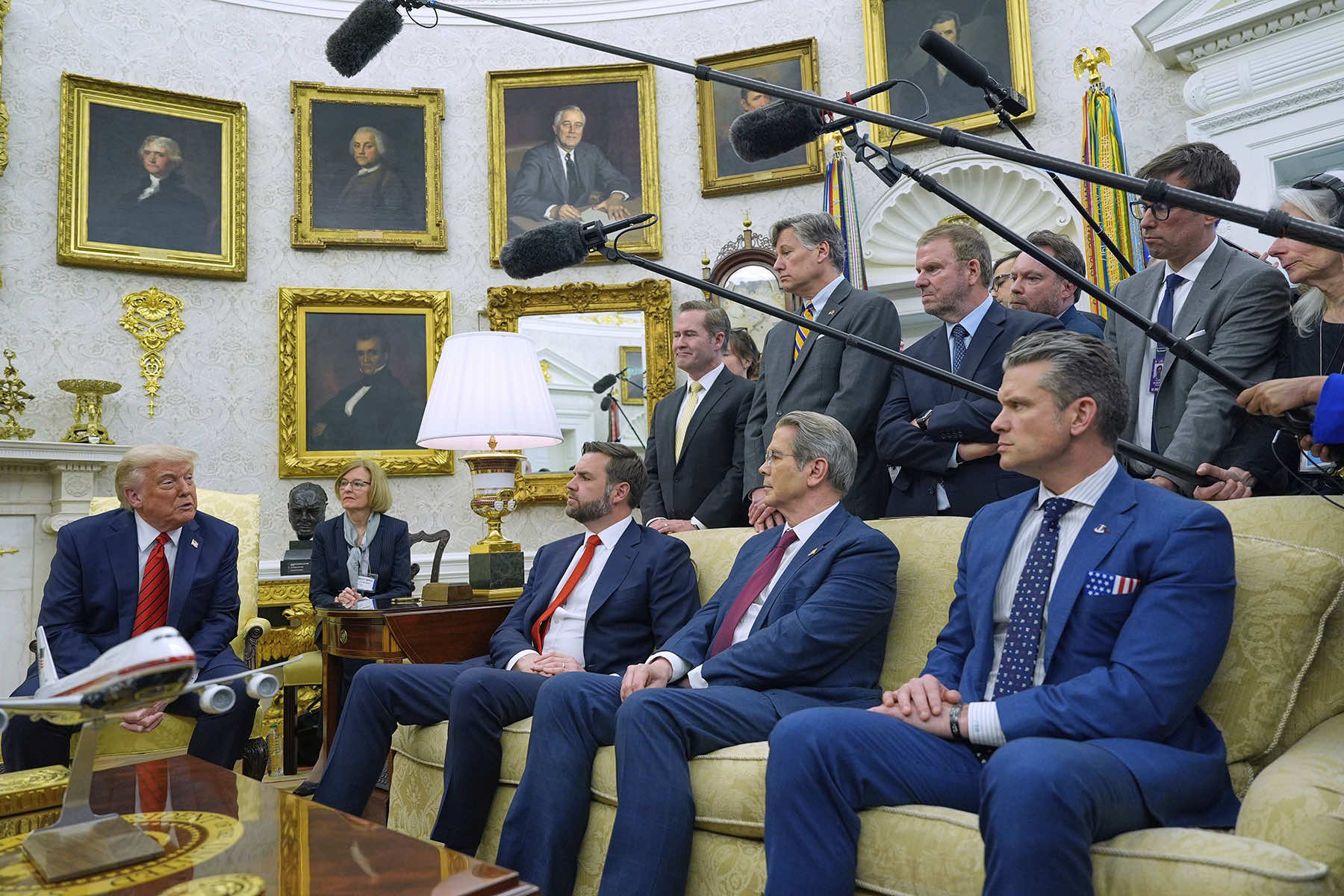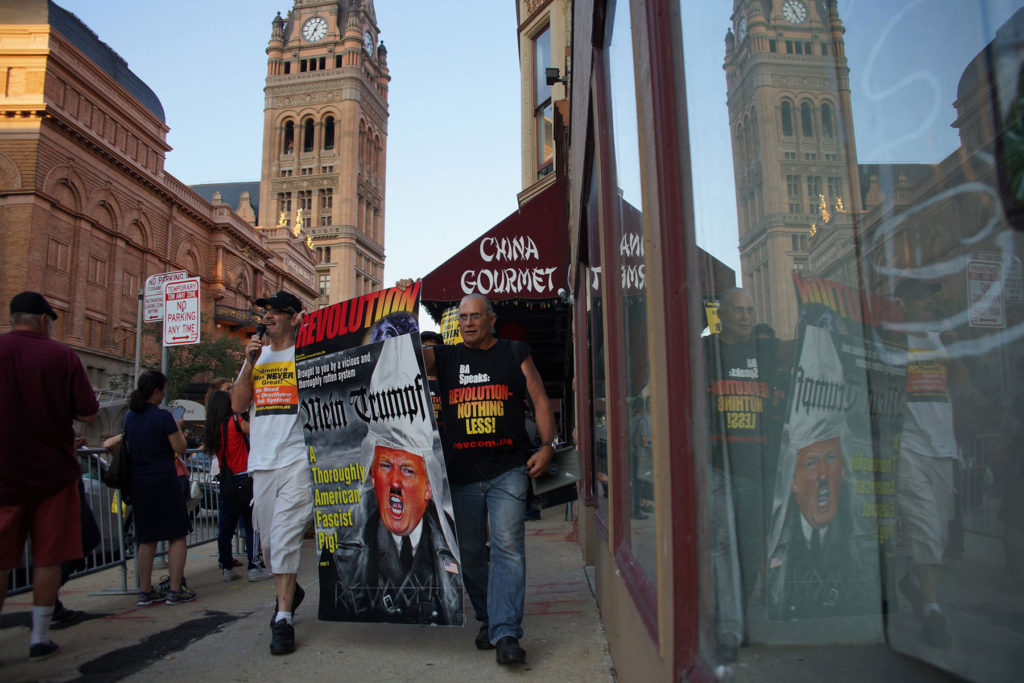
In the medieval world, power was a matter of proximity. Kings granted land in exchange for loyalty. Lords demanded tribute. Peasants, with no direct voice in their governance, lived and died under a rule they could not challenge.
The architecture of feudalism was rigid but familiar: hierarchies enforced by violence, loyalty bought with favor, and truth subordinated to the ambitions of the ruling elite.
A thousand years later, that architecture looks different, but the principles remain. In the United States under Donald Trump, both during his first presidency and again now, the reappearance of feudalistic dynamics is not academic.
It is visceral. What we are witnessing is not just the decay of democratic norms, but the consolidation of a culture where fear, performance, and personal loyalty have become the currency of power.
Nowhere is this clearer than inside the Trump regime itself, where allies turn on one another in pursuit of influence, and policy is secondary to spectacle. Reports of the ongoing internal clashes paint a vivid picture of a government mired in internal conflict. It is a White House where personnel decisions are driven less by competence than by compliance.
Defense Secretary Pete Hegseth, for example, remained in his post despite chaos surrounding his conduct, including reports of sharing classified military operations in unsecured digital chats. Rather than denounce the breach, Trump defended Hegseth, dismissing the backlash as “fake news.” The facts were immaterial. What mattered was loyalty and ego.
This is nothing new. During Trump’s first term, his administration cycled through chiefs of staff, national security advisers, and communications directors at a dizzying pace. Those who questioned him, from General John Kelly to Secretary of Defense James Mattis, were sidelined or scorned.
Those who embraced his confrontational, zero-sum view of politics found promotion. In such an ecosystem, power is sustained not through institutional service but by theatrical allegiance to the man at the center. No matter how mad that man may be.
In a historical context, this echoes the feudal court where access to the sovereign was the only path to influence, and where rivals maneuvered not through policy debate, but through character assassination, intrigue, and whispered betrayal.
Today’s Trump loyalists are yesterday’s palace courtiers. Their weapons are not swords but Signal chats and social media posts. Their battleground is not a kingdom, but the West Wing and the wider machinery of federal authority.
The spectacle is self-reinforcing. It creates a culture of bullying, where domination is valued above discourse, and where even internal dissent is treated as disloyalty.
Former Trump officials, now turned critics, describe a climate of “meltdown” and surveillance, where figures like far-right provocateur Laura Loomer are not just welcomed, but given influence over White House personnel. Her crusades to weed out “disloyal” staffers are met not with caution, but with action.
People are fired on a whim. Decisions are made without thought. Followers like her are empowered, and the damage they wrought to the American public is extensive.
The logic is unmistakable: paranoia is rewarded, and power flows through loyalty tests, not qualifications.
Those not caught in the orbit of MAGA’s cult leader must choose: echo the message or face exclusion.
Trump’s trade advisers have engaged in public feuds, notably South African oligarch Elon Musk clashing with Peter Navarro, but no one gets removed unless their disloyalty becomes a public spectacle. Even then, the punishment is inconsistent. The line between critique and betrayal is invisible, shifting, and ultimately determined by Trump himself.
It all mirrors the feudal concept of “favor,” a political force not bound by law, only by the whims of the throne.
The resulting chaos is not an accident. It is a strategy. Trump has long styled himself as an outsider-king, dismantling the bureaucratic state under the guise of reform while replacing it with a personality-driven hierarchy.
The more unstable the environment, the more dependent everyone becomes on his approval. The calculus is simple: undermine traditional institutions, elevate personal allegiance, and convert the state into a reflection of the twisted sovereign.
The consequences for democracy are profound. In a functioning republic, institutions serve as buffers against individual rule. Courts check the executive, agencies provide continuity, and elections offer renewal.
But in a feudalized system dominated by bullies, those institutions are either ignored or repurposed to serve the ambitions of the dominant power. Truth becomes optional. Loyalty becomes everything.
Nowhere is this more alarming than in Trump’s posture toward the military. Despite mounting controversies, including the inclusion of non-government actors in confidential national security discussions, the White House has attacked Pentagon staff, portraying the institution as part of a resistance to “monumental change.” In doing so, it casts the military not as a pillar of national security but as a threat to presidential authority.
This inversion, where the state is viewed as an obstacle rather than a responsibility, is central to the bully culture that animates Trump’s political movement. It is not merely about strength. It is about domination. And domination, in this logic, requires enemies.
Whether those enemies are civil servants, journalists, immigrants, or even former allies, the cycle is the same: isolate, discredit, replace. Every challenge is a betrayal. Every loyalty must be visible. Every silence is suspicious.
The damage goes far beyond Washington. Across the country, this worldview encourages American citizens not to engage, but to fear. Not to deliberate, but to shout. Not to build, but to destroy. It breeds a toxic political environment in which power is protected through intimidation, and criticism is treated not as civic engagement but as a personal attack.
None of this happens in a vacuum. The culture of coercion flows outward, metastasizing into state governments, media ecosystems, and local political structures. Trump’s model of rewarding the sycophants and destroying the skeptics is increasingly the blueprint for political survival in his party. It is not enough to agree. One must perform devotion. It is not enough to avoid criticism. One must attack those deemed enemies.
This is not ideological. It is feudal. In classic feudalism, lords demanded tribute. Today’s political barons in the Republican party demand retweets, public declarations of allegiance, and the vilification of perceived traitors. It is a transactional loyalty, not to ideas or outcomes, but to the central figure who confers power.
And yet, the illusion of unity is just that — an illusion. Behind the public performances of loyalty is a court in disarray. Advisers feuding. Departments fracturing. A national security apparatus strained by amateur intervention and populist paranoia. And an executive who brushes off every fracture as “fake news,” even as the cracks widen beneath him.
This is the irony of bully culture: it demands strength, but it feeds on insecurity. Trump’s political dominance relies on projecting absolute control, yet it is precisely that control that is constantly in doubt.
Every feud, every leak, every scandal — even among his closest allies — is a sign of the system devouring itself. Like any feudal regime, it becomes trapped in a cycle of purges and promotions, of instability masked as dynamism.
In this environment, truth cannot thrive. Facts are reshaped to match loyalty narratives. Transparency is performative, not substantive. When challenged about the dysfunction inside the administration, White House spokespersons offer platitudes about teamwork and results, while dismissing legitimate concerns as partisan or disloyal.
It is the language of gaslighting, not governance.
But while the palace feuds may entertain, the consequences are deadly serious. A presidency governed by personal loyalty over competence creates real risk, from mismanaged crises to erratic foreign policy to a weakened civil service demoralized by constant upheaval.
As former national security adviser John Bolton noted, the current configuration of Trump’s inner circle lacks not just ideological coherence but professional seriousness. They were not hired to govern. They were hired to obey.
That is the blueprint Trump has always preferred — an empire of enforcers, not experts. He does not seek to command a bureaucracy. He seeks to dominate a court. In this framework, competence is expendable, but loyalty is sacred.
It is the reason why figures like Musk gain access while seasoned advisers are ignored. Why veteran officials are discarded for speaking hard truths while conspiracists are elevated for flattering lies.
It is also why the churn of conflict is not a bug, but a feature. Chaos sustains the hierarchy by ensuring that no one outside the central figure becomes too powerful, too independent, or too credible. In feudal terms, the king must always keep his vassals in competition. Their survival depends not on performance, but on proximity. And the constant threat of banishment, or public humiliation, is what enforces compliance.
The modern result is a presidency governed not by policy but by power rituals. Personnel decisions are made in Oval Office meetings with internet provocateurs. Foreign policy is tangled in personal feuds and tariffs that change direction based on whose loyalty is being tested that week.
All the while, Americans are told this is normal. That such insane behavior is what true leadership looks like under the MAGA mythology. That brutality is strength, and decency is weakness. That to question authority is to betray the cause. It is the logic of the medieval castle, with tall walls, deep moats, and a population that knows its place.
But Americans are not peasants. And the United States is not a castle.
If democracy is to mean anything, it must reject this feudal bargain. It must refuse the culture of bullies and performative allegiance. It must assert that truth matters more than proximity, that competence outweighs loyalty, and that power in a republic belongs to the people, not to the corrupt sovereign who demands tribute.
The United States does not need a king. It needs a government. And it must remember the difference, before the pageantry of loyalty becomes the law of the land.
© Photo
Alex Brandon (AP)















